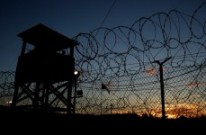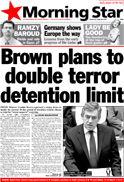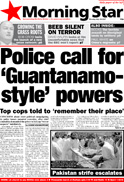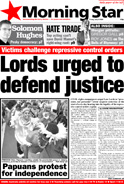 MI5 contributed to the seizure of two British residents by the CIA, which secretly flew them to Guantánamo Bay in a move with “serious implications for the intelligence relationship” between Britain and the US, a cross-party committee of senior MPs said in a damning report released yesterday.
MI5 contributed to the seizure of two British residents by the CIA, which secretly flew them to Guantánamo Bay in a move with “serious implications for the intelligence relationship” between Britain and the US, a cross-party committee of senior MPs said in a damning report released yesterday.
The security service passed information to the Americans on Bisher al-Rawi, an Iraqi, and Jamil el-Banna, from Jordan, as they flew to the Gambia to set up a business there in 2002. Both had lived in Britain for many years.
Mr Rawi was released from Guantánamo in March after evidence emerged in a British court that he helped MI5 monitor Abu Qatada, the radical cleric. Mr Banna is still held in the US base on Cuba. Though the US has said he can leave, the British government said his UK residence status had expired because of his absence.
In its report yesterday, the parliamentary intelligence and security committee said MI5 was “indirectly and inadvertently” involved in the rendition of the two men by passing on the information, which included claims about their Islamist sympathies. In unprecedented criticism of Britain’s security and intelligence agencies, the committee said both MI6 and MI5 “were slow to appreciate [the] change in US rendition policy” – a reference to the practice of seizing terrorist suspects and flying them to secret destinations where they risked being tortured.
Clive Stafford Smith, legal director of Reprieve, which represents prisoners open to abuse, said last night: “The report makes clear some awful facts about the arrest and rendition of Jamil el-Banna and Bisher al-Rawi. The British government sent the Americans incorrect information that led directly to the arrest of these men … Jamil remains in Guantánamo Bay while the UK dithers about whether to allow him home to his wife and five British children. The UK started this chain of suffering. It must end it and bring Jamil back.”

 Brown plans to double terror detention limit
Brown plans to double terror detention limit DALLAS — A group that was once the nation’s largest Muslim charity went on trial on terrorism-support charges Tuesday, with federal prosecutors saying it hoped to destroy Israel and the defense claiming leaders sought advice on staying true to their humanitarian mission.
DALLAS — A group that was once the nation’s largest Muslim charity went on trial on terrorism-support charges Tuesday, with federal prosecutors saying it hoped to destroy Israel and the defense claiming leaders sought advice on staying true to their humanitarian mission. Police call for ‘Guantanamo-style’ powers
Police call for ‘Guantanamo-style’ powers Lords urged to defend justice
Lords urged to defend justice Police chiefs were last night under intense pressure to use racial profiling in the battle to prevent further terror strikes.
Police chiefs were last night under intense pressure to use racial profiling in the battle to prevent further terror strikes. There have been Commons clashes over whether or not Islamic organisation Hizb ut-Tahrir should be banned. Conservative leader David Cameron told MPs that ministers should act against “groups which are seeking to radicalise young people”. The government had pledged to ban the group two years ago, he said. “We think it should be banned. Why hasn’t it happened?” Gordon Brown said that “you have to have evidence” to ban any group. But Cameron said that Hizb ut-Tahrir is “poisoning the minds of young people”.
There have been Commons clashes over whether or not Islamic organisation Hizb ut-Tahrir should be banned. Conservative leader David Cameron told MPs that ministers should act against “groups which are seeking to radicalise young people”. The government had pledged to ban the group two years ago, he said. “We think it should be banned. Why hasn’t it happened?” Gordon Brown said that “you have to have evidence” to ban any group. But Cameron said that Hizb ut-Tahrir is “poisoning the minds of young people”.